DAY 382 OF THE WAR: Three Soldiers Killed, Rockets Fired at Central Israel, Blinken Meets Netanyahu, Another Iranian Spy Ring Uncovered
Tel Aviv Diary, October 22, 2024
NOTE: There will be no Tel Aviv Diary tomorrow night, October 23rd-24th (in observance of the Simchat Torah holiday in Israel and abroad). The next scheduled Tel Aviv Diary entry will be posted on Saturday night, October 26th—unless news developments warrant an earlier update.
∞–––––∞–––––∞–––––∞–––––∞–––––∞–––––∞–––––∞–––––∞
This morning in the Tel Aviv area, those who planned to sleep late were rudely awakened by Hezbollah. I was already out for my routine morning walk with our dog, Milo, crossing through Hostage Square, a path I've mentioned in previous diary entries. Just as I neared the square, a missile attack alert for Herzliya popped up. Based on past experiences, I anticipated that an alert would shortly go off in Tel Aviv as well. Sure enough, moments later, the sirens began to blare. Being directly across from Israel's military headquarters, the volume of the alarms was even more intense. Milo and I hastily retreated to the safety of the underground parking lot beneath the square
.
The sirens seemed to go on longer than usual, but when they finally stopped, Milo and I remained in the garage for an additional ten minutes. We then headed home to find my family still groggy, sprawled out across the couch. Hezbollah had launched five missiles at the Tel Aviv area; four were intercepted, and one fell in an open field near residential areas in Kibbutz Maagan Michael. Thankfully, no one was injured, although the blast caused damage to several homes.
Towards noon, a rocket attack in the North resulted in a more tragic outcome. A rocket struck near Neot Mordechai, striking an artillery unit, and killed Master Sergeant (Res.) Saar Eliad Navarsky (27) from Tel Aviv.
In total, Hezbollah fired over 150 rockets at Israel today.
This evening, Hezbollah deployed a drone southward along Israel’s coast. The drone continued on its flight path, and the Air Force appeared to lose track of it. For more than an hour, nearly a million people sought refuge in bomb shelters, until the all-clear signal was issued. It remains unclear what happened to the drone.
Earlier today, it was announced that First Sergeant Yishai Mann (21), from Mitzpe Yericho, died in an operational accident near Gaza.
Tonight, it was disclosed that Major (Res.) Aviram Hariv (42), from Dolev, was killed in combat in Lebanon
.
IN LEBANON
Today, Israel continued its bombing campaign in Beirut's Dahiya district. The IDF Commander of the Northern Command stated:
So as we began [Operation] “Northern Arrows”, we dealt a very severe blow to Hezbollah’s command and control. Most of the battalion commanders have already been neutralized for the third time, and the reality of their operational continuity has been severely damaged
.
Every defensive area we attacked has been overcome. We are determined to reach every tunnel, every underground area, every weapons cache – to destroy or capture it.
Tonight, three weeks after the IAF eliminated Hashem Safi Al-Din, head of Hezbollah’s executive council and Nasrallah’s presumed replacement, reports in Lebanon stated that Al-Din’s body was recovered from underneath rubble. The IDF released the following statement regarding Al-Din:
The IDF eliminated Hashem Safi Al-Din, the head of Hezbollah's executive council. It can now be confirmed that around three weeks ago, during an attack in Dahieh, Beirut, Hashem Safi Al-Din, the head of Hezbollah's executive council, and Hussein Ali al-Zeimah, the head of Hezbollah's intelligence headquarters, were killed, along with other Hezbollah commanders.
Air Force fighter jets, guided by precise intelligence from the Intelligence Directorate, struck Hezbollah's main intelligence headquarters, located underground in the heart of a civilian area in Dahieh, Beirut.
At the headquarters, over 25 terrorists belonging to the organization's intelligence division were present, including Bilal Saab Ayash, head of aerial intelligence collection, and Mahmoud Mohammad Shaheen, head of Hezbollah's intelligence headquarters in Syria.
Hashem Safi Al-Din was a member of the Shura Council, Hezbollah's highest military-political forum responsible for the organization's decision-making and policies.
It was officially announced today that the drone deployed on Saturday indeed hit the home of Prime Minister Netanyahu in Caesarea. Until now this [acknowledgement of the successful drone hit] was not official. Only minor damage was done to the house. Today, Hezbollah officially took responsibility for the drone attack.
U.S. SECRETARY OF STATE BLINKEN RETURNS TO ISRAEL
Today, Secretary of State Blinken met with Prime Minister Netanyahu for two and a half hours.
Here is Blinken’s read-out from the meeting:
Secretary of State Antony J. Blinken met today with Israeli Prime Minister Benjamin Netanyahu in Jerusalem. The Secretary underscored the need to capitalize on Israel’s successful action to bring Yahya Sinwar to justice by securing the release of all hostages and ending the conflict in Gaza in a way that provides lasting security for Israelis and Palestinians alike. He discussed the importance of charting a new path forward in the post-conflict period that allows Palestinians to rebuild their lives and provides governance, security, and reconstruction for Gaza. The Secretary emphasized the need for Israel to take additional steps to increase and sustain the flow of humanitarian assistance into Gaza and ensure that assistance reaches civilians throughout Gaza.
The Secretary and Prime Minister also discussed Lebanon and ongoing efforts to reach a diplomatic resolution along the Blue Line that includes full implementation of UN Security Council Resolution 1701 and allows civilians on both sides of the border to return to their homes. They discussed the need to deter further regional aggression from Iran and its proxies, including ongoing efforts by the United States and its partners. The Secretary reaffirmed the United States’ ironclad commitment to Israel’s security.
Prime Minister Netanyahu’s office issued their own readout:
Prime Minister Benjamin Netanyahu met today for about two and a half hours with U.S. Secretary of State Antony Blinken. The meeting was friendly and productive, followed by a broader meeting with the participation of professional teams from both countries. During the meeting, the issue of the Iranian threat and the need for both countries to unite forces against it was raised. The Prime Minister thanked the U.S. Secretary of State for the United States’ support in the fight against Iran’s axis of evil and terror.
The Prime Minister updated the U.S. Secretary of State on the IDF’s operations in Lebanon and on the need to bring about a security and political change in the north that will allow Israel to return its residents to their homes safely.
The U.S. Secretary of State expressed the deep shock of the United States over Iran’s attempt, through Hezbollah, to assassinate the Prime Minister of Israel and clarified that this was an extreme and exceptional event. The Prime Minister thanked the Secretary of State and noted that this issue has dramatic implications and must not be overlooked.
The Prime Minister also spoke with the U.S. Secretary of State about the progress of the fighting in Gaza against the Hamas terror organization and the extraordinary efforts Israel is making to bring all the hostages home.
Both sides discussed the issue of governance in Gaza after the war. The Prime Minister emphasized that eliminating Hamas leader Yahya Sinwar could have a positive impact on the return of the hostages, achieving all the war’s goals, and on the post-war situation.
Blinken is working toward ending the war through a comprehensive agreement. I believe the prospects of resolving the conflict in the North are higher than in Gaza. Resolution 1701 [see text below] could serve as a foundation, although, as U.S. envoy Amos Hochstein noted yesterday in Beirut— while Resolution 1701 was an effective way to end the Second Lebanon War, it was never enforced.
Hezbollah is currently in its weakest position since its earliest years, and other players in Lebanon sense an opportunity. While in 2006 Hezbollah gave its approval for the Lebanese government to accept UN Security Council Resolution 1701—with no intention of adhering to it—this time, the other players in Lebanon (e.g. Sunnis, Christians and Druze) might force compliance.
Today, Gebran Bassil, leader of the Free Patriotic Movement in Lebanon (Christians), who was once a political ally of Hezbollah and enabled a coalition that included Hezbollah ministers, criticized Hezbollah in an interview with Al Arabiya. Bassil said:
Hezbollah prevented Lebanon from using the argument of ‘self-defense’ by initiating the war as part of its support for Gaza. We disagree with Hezbollah regarding its support for Gaza. Hezbollah has weakened us, and as a result, we have lost power in Lebanon.
I hold Hezbollah responsible for the ‘unification of the fronts’ strategy. It is not in Lebanon’s interest. Iran should fight Israel directly, not through Lebanon. The Free Patriotic Movement is no longer in an alliance with Hezbollah. Lebanon is facing the threat of civil war and existential danger.
ANOTHER IRANIAN SPY RING DISCOVERED
Today, authorities announced the discovery and arrest of another Iranian spy ring. Comprised of seven young individuals from Beit Safafa, the group was assigned several tasks, including burning cars and assassinating a mayor. However, they were apprehended before progressing beyond the initial stages. This marks the fifth such ring uncovered in the past two months, raising concerns that these incidents may only represent the beginning of a broader network of Iranian spy rings.
YEHUDA BAUER, IN MEMORIAM
Last weekend, Professor Yehuda Bauer passed away. My first encounter with his work was through his book "Flight and Rescue: Brichah," published in 1970. His work explored the escape of Jews from Europe to Palestine during and after World War II. At the time I read it, it was just another book on a topic that intrigued me. Although I only met Professor Bauer a few times, I primarily came to know him through others. He was regarded as the foremost Holocaust scholar at Hebrew University and led the Institute for Contemporary Judaism for many years.
Bauer served as the PhD advisor to a close friend of mine, who, like Bauer, was a member of a kibbutz. Through my friend—and occasionally through his wife, who worked for Bauer for some time—I would hear stories about him. It was Bauer who persuaded my friend to author what I still regard as the best analysis of the predicament of American Jews during the Holocaust, titled "Jews Without Power."
A few years ago, I had the privilege of attending a lecture by Professor Bauer, who was then in his 90s. He presented his view that Hitler’s fixation on annihilating the Jews was the fundamental cause of World War II. While I didn’t concur with every point he made, the lecture itself was exceptional.
Professor Bauer’s contribution to Holocaust research and knowledge is unparalleled. Bauer was also the founding editor of Moreshet: The Journal for the Study of the Holocaust and Antisemitism.” My wife continues to layout and produce its yearly English edition. The latest issue, released last week, features one of Bauer’s final essays (A memorial to Israel Gutman, z”l – On the Hundredth Anniversary of his Birth and a Decade since his Passing).
Lastly, Yehuda Bauer is responsible for my writing ‘antisemitism’ as one word. My inclination was always to write it with a hyphen, but my wife would remind me that Professor Bauer insisted it be written as one word, unhyphenated, to amplify the potency of the term.
Yehuda Bauer, who was born in Czechoslovakia and immigrated to Palestine shortly before the onset of World War II, passed away in Jerusalem at the age of 98.
BUSINESS
OneStep, a startup founded in 2019 by four Talpiot Program graduates, has secured $36 million in Series B funding, bringing their total investment to $48 million. OneStep has developed innovative technology that transforms smartphones into sophisticated movement monitoring devices, using existing phone sensors to analyze gait and movement patterns. Their solution offers an accessible alternative to traditional gait analysis laboratories, providing immediate results and continuous monitoring through 40 different metrics.
OneStep's FDA-approved technology is being used across various healthcare settings, including hospitals and physical therapy centers, where it has demonstrated impressive results —helping patients recover 45% faster and reducing falls among elderly patients by 20%. OneStep has recently expanded into cognitive monitoring for conditions like Alzheimer's and Parkinson's disease, with the ultimate vision of making gait measurement as routine as daily weight checks.
∞–––––∞–––––∞–––––∞–––––∞–––––∞–––––∞–––––∞–––––∞
A PIECE OF HISTORY
Second Lebanon War— Part 4
After the IDF’s setback at Bint Jbeil, the last week of July and the first week of August saw limited Israeli incursions into Lebanon, yielding minimal success. A consistent issue for the Israeli forces entering the region was the challenge of resupply. At a meeting of the Security Cabinet on July 27, 2006, it was decided to mobilize three divisions—62,000 reservists. Meanwhile, the Air Force continued to attack targets, which had some impact. Concurrently, negotiations were ongoing to reach a ceasefire, including a proposed Security Council Resolution designed to establish a mechanism to deter Hezbollah from approaching the border. By the first week of August, these negotiations had made substantial progress.
The Israeli Army advocated for a major ground invasion to try and restore Israel’s deterrence following lackluster results in earlier engagements on the ground. On August 6th, a Katyusha rocket struck near Kfar Giladi, hitting a bivouac (a temporary camp without tents or cover) of reserve paratroopers and killing 12 soldiers. This incident, occurring almost a month into the war and resulting in the deaths of 12 soldiers on Israeli soil, dealt a significant blow. On the same day, a rocket attack on Haifa claimed the lives of three civilians.
Although the negotiations at the United Nations were moving in Israel’s favor, some issues remained unresolved. As the talks neared conclusion, government approval was given for the IDF to begin an offensive on the evening of Friday, August 9th. The objective was to move quickly into Lebanon, advancing as far as the Litani River. However, the attack did not go as planned. A tank brigade was enveloped in anti-tank fire, which disabled most of the tanks. Israel lost 11 soldiers, and an additional 50 were wounded, in what became known as the Battle of Saluki-Randoria.
During the offensive, the operation faced a major setback while attempting to deploy a brigade deep behind enemy lines via helicopter. The plan involved conducting 20 flights to transport troops. However, after the second helicopter delivered its troops near the village of Yara, it was struck by an anti-aircraft missile and crashed, resulting in the deaths of its crew. The remaining helicopter flights were cancelled, and the troops were left to proceed on their own. By that time, Lebanon had agreed to the UN ceasefire plan, and Israel accepted it the following day. The ceasefire took effect on the morning of Monday, August 14th.
During the final two days of combat, efforts to reinforce Israeli deterrence—or possibly to salvage the reputations of certain military officials—resulted in the deaths of 33 soldiers. On the final day, Hezbollah managed to launch 250 rockets into Israel.
The war tragically concluded on Wednesday, July 16, 2008, with a significant prisoner and remains exchange between Hezbollah and Israel. Hezbollah returned the coffins of captured Israeli soldiers Ehud Goldwasser and Eldad Regev. In return, Israel released Samir Kuntar, a member of the Palestine Liberation Front, four Hezbollah fighters taken during the conflict, and the bodies of approximately 200 other Lebanese and Palestinian militants previously held by Israel. Throughout their captivity, Hezbollah had provided no information about the condition of Goldwasser and Regev and denied the Red Cross access to them.
Israel's Second Lebanon War (in numbers):
Days of Fighting ………………………..…… 33
Israeli Casualties ……………………….…… 119 soldiers; 42 civilians
Lebanese Casualties ……………………..… at least 900 civilians/ 500 Hezbollah fighters
Rockets fired at Israel …………………..….. 3,970
IAF sorties …………………………..……….. 15,500
Target Struck in Lebanon ………………..… 7,000
Hezbollah rocket launchers destroyed …… 136
Israeli tanks destroyed ………………….…. 20 ( 6 by mines/14 to anti-tank missiles)
Israeli Helicopters shot down ……………… 1
Israeli Aircraft lost to accidents …………… 4
Israeli Artillery shells fired …………….……. 100,000
U.N. Resolution 1701 (2006)
Adopted by the Security Council at its 5511th meeting, on 11 August 2006
The Security Council,
Recalling all its previous resolutions on Lebanon, in particular resolutions 425 (1978), 426 (1978), 520 (1982), 1559 (2004), 1655 (2006) 1680 (2006) and 1697 (2006), as well as the statements of its President on the situation in Lebanon, in particular the statements of 18 June 2000 (S/PRST/2000/21), of 19 October 2004 (S/PRST/2004/36), of 4 May 2005 (S/PRST/2005/17), of 23 January 2006 (S/PRST/2006/3) and of 30 July 2006 (S/PRST/2006/35), Expressing its utmost concern at the continuing escalation of hostilities in Lebanon and in Israel since Hizbollah’s attack on Israel on 12 July 2006, which has already caused hundreds of deaths and injuries on both sides, extensive damage to civilian infrastructure and hundreds of thousands of internally displaced persons, Emphasizing the need for an end of violence, but at the same time emphasizing the need to address urgently the causes that have given rise to the current crisis, including by the unconditional release of the abducted Israeli soldiers, Mindful of the sensitivity of the issue of prisoners and encouraging the efforts aimed at urgently settling the issue of the Lebanese prisoners detained in Israel, Welcoming the efforts of the Lebanese Prime Minister and the commitment of the Government of Lebanon, in its seven-point plan, to extend its authority over its territory, through its own legitimate armed forces, such that there will be no weapons without the consent of the Government of Lebanon and no authority other than that of the Government of Lebanon, welcoming also its commitment to a United Nations force that is supplemented and enhanced in numbers, equipment, mandate and scope of operation, and bearing in mind its request in this plan for an immediate withdrawal of the Israeli forces from southern Lebanon, Determined to act for this withdrawal to happen at the earliest, Taking due note of the proposals made in the seven-point plan regarding the Shebaa farms area.
Welcoming the unanimous decision by the Government of Lebanon on 7 August 2006 to deploy a Lebanese armed force of 15,000 troops in South Lebanon as the Israeli army withdraws behind the Blue Line and to request the assistance of additional forces from the United Nations Interim Force in Lebanon (UNIFIL) as needed, to facilitate the entry of the Lebanese armed forces into the region and to restate its intention to strengthen the Lebanese armed forces with material as needed to enable it to perform its duties,
Aware of its responsibilities to help secure a permanent ceasefire and a long-term solution to the conflict. Determining that the situation in Lebanon constitutes a threat to international peace and security,
Calls for a full cessation of hostilities based upon, in particular, the immediate cessation by Hizbollah of all attacks and the immediate cessation by Israel of all offensive military operations;
Upon full cessation of hostilities, calls upon the Government of Lebanon and UNIFIL as authorized by paragraph 11 to deploy their forces together throughout the South and calls upon the Government of Israel, as that deployment begins, to withdraw all of its forces from southern Lebanon in parallel;
Emphasizes the importance of the extension of the control of the Government of Lebanon over all Lebanese territory in accordance with the provisions of resolution 1559 (2004) and resolution 1680 (2006), and of the relevant provisions of the Taif Accords, for it to exercise its full sovereignty, so that there will be no weapons without the consent of the Government of Lebanon and no authority other than that of the Government of Lebanon;
Reiterates its strong support for full respect for the Blue Line;
Also reiterates its strong support, as recalled in all its previous relevant resolutions, for the territorial integrity, sovereignty and political independence of Lebanon within its internationally recognized borders, as contemplated by the Israeli-Lebanese General Armistice Agreement of 23 March 1949;
Calls on the international community to take immediate steps to extend its financial and humanitarian assistance to the Lebanese people, including through facilitating the safe return of displaced persons and, under the authority of the Government of Lebanon, reopening airports and harbours, consistent with paragraphs 14 and 15, and calls on it also to consider further assistance in the future to contribute to the reconstruction and development of Lebanon;
Affirms that all parties are responsible for ensuring that no action is taken contrary to paragraph 1 that might adversely affect the search for a long-term solution, humanitarian access to civilian populations, including safe passage for humanitarian convoys, or the voluntary and safe return of displaced persons, and calls on all parties to comply with this responsibility and to cooperate with the Security Council;
Calls for Israel and Lebanon to support a permanent ceasefire and a long- term solution based on the following principles and elements:
– full respect for the Blue Line by both parties;
– security arrangements to prevent the resumption of hostilities, including the establishment between the Blue Line and the Litani river of an area free of any armed personnel, assets and weapons other than those of the Government of Lebanon and of UNIFIL as authorized in paragraph 11, deployed in this area;
– full implementation of the relevant provisions of the Taif Accords, and of resolutions 1559 (2004) and 1680 (2006), that require the disarmament of all armed groups in Lebanon, so that, pursuant to the Lebanese cabinet decision of 27 July 2006, there will be no weapons or authority in Lebanon other than that of the Lebanese State;
– no foreign forces in Lebanon without the consent of its Government;
– no sales or supply of arms and related materiel to Lebanon except as authorized by its Government;
– provision to the United Nations of all remaining maps of landmines in Lebanon in Israel’s possession;
Invites the Secretary-General to support efforts to secure as soon as possible agreements in principle from the Government of Lebanon and the Government of Israel to the principles and elements for a long-term solution as set forth in paragraph 8, and expresses its intention to be actively involved;
Requests the Secretary-General to develop, in liaison with relevant international actors and the concerned parties, proposals to implement the relevant provisions of the Taif Accords, and resolutions 1559 (2004) and 1680 (2006), including disarmament, and for delineation of the international borders of Lebanon, especially in those areas where the border is disputed or uncertain, including by dealing with the Shebaa farms area, and to present to the Security Council those proposals within thirty days;
Decides, in order to supplement and enhance the force in numbers, equipment, mandate and scope of operations, to authorize an increase in the force strength of UNIFIL to a maximum of 15,000 troops, and that the force shall, in addition to carrying out its mandate under resolutions 425 and 426 (1978):
(a) Monitor the cessation of hostilities;
(b) Accompany and support the Lebanese armed forces as they deploy throughout the South, including along the Blue Line, as Israel withdraws its armed forces from Lebanon as provided in paragraph 2;
(c) Coordinate its activities related to paragraph 11 (b) with the Government
of Lebanon and the Government of Israel;
(d) Extend its assistance to help ensure humanitarian access to civilian populations and the voluntary and safe return of displaced persons;
(e) Assist the Lebanese armed forces in taking steps towards the establishment of the area as referred to in paragraph 8;
(f) Assist the Government of Lebanon, at its request, to implement paragraph 14;
Acting in support of a request from the Government of Lebanon to deploy an international force to assist it to exercise its authority throughout the territory, authorizes UNIFIL to take all necessary action in areas of deployment of its forces and as it deems within its capabilities, to ensure that its area of operations is not utilized for hostile activities of any kind, to resist attempts by forceful means to prevent it from discharging its duties under the mandate of the Security Council, and to protect United Nations personnel, facilities, installations and equipment, ensure the security and freedom of movement of United Nations personnel, humanitarian workers and, without prejudice to the responsibility of the Government of Lebanon, to protect civilians under imminent threat of physical violence;
Requests the Secretary-General urgently to put in place measures to ensure UNIFIL is able to carry out the functions envisaged in this resolution, urges Member States to consider making appropriate contributions to UNIFIL and to respond positively to requests for assistance from the Force, and expresses its strong appreciation to those who have contributed to UNIFIL in the past;
Calls upon the Government of Lebanon to secure its borders and other entry points to prevent the entry in Lebanon without its consent of arms or related materiel and requests UNIFIL as authorized in paragraph 11 to assist the Government of Lebanon at its request;
Decides further that all States shall take the necessary measures to prevent, by their nationals or from their territories or using their flag vessels or aircraft:
(a) The sale or supply to any entity or individual in Lebanon of arms and related materiel of all types, including weapons and ammunition, military vehicles and equipment, paramilitary equipment, and spare parts for the aforementioned, whether or not originating in their territories; and
(b) The provision to any entity or individual in Lebanon of any technical training or assistance related to the provision, manufacture, maintenance or use of the items listed in subparagraph (a) above; except that these prohibitions shall not apply to arms, related material, training or assistance authorized by the Government of Lebanon or by UNIFIL as authorized in paragraph 11;
Decides to extend the mandate of UNIFIL until 31 August 2007, and expresses its intention to consider in a later resolution further enhancements to the mandate and other steps to contribute to the implementation of a permanent ceasefire and a long-term solution;
Requests the Secretary-General to report to the Council within one week on the implementation of this resolution and subsequently on a regular basis;
Stresses the importance of, and the need to achieve, a comprehensive, just and lasting peace in the Middle East, based on all its relevant resolutions including its resolutions 242 (1967) of 22 November 1967, 338 (1973) of 22 October 1973 and 1515 (2003) of 19 November 2003;
Decides to remain actively seized of the matter.




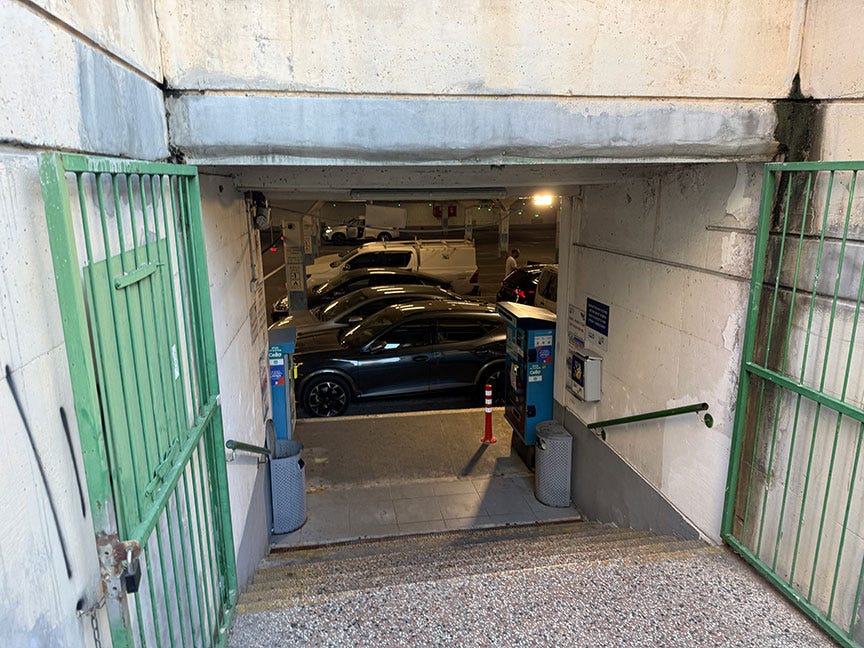

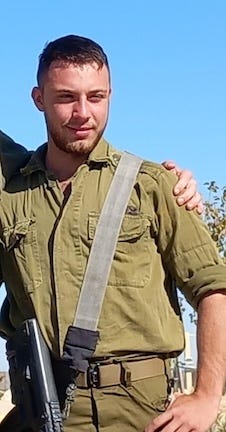
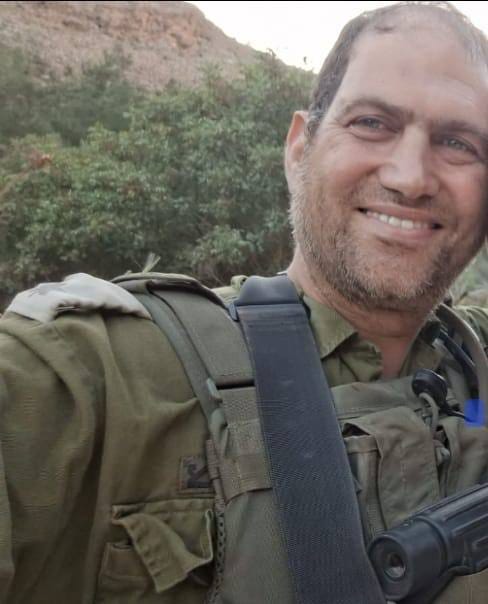
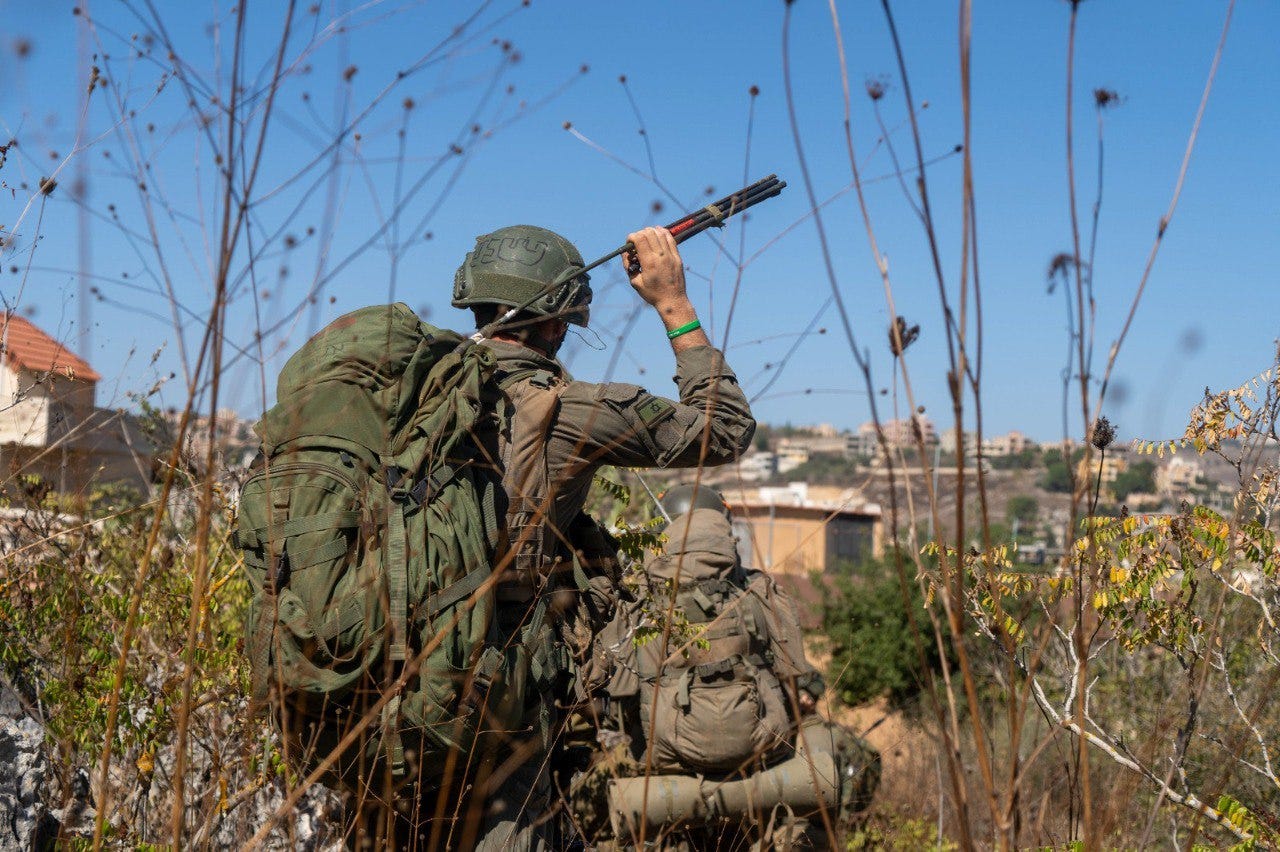
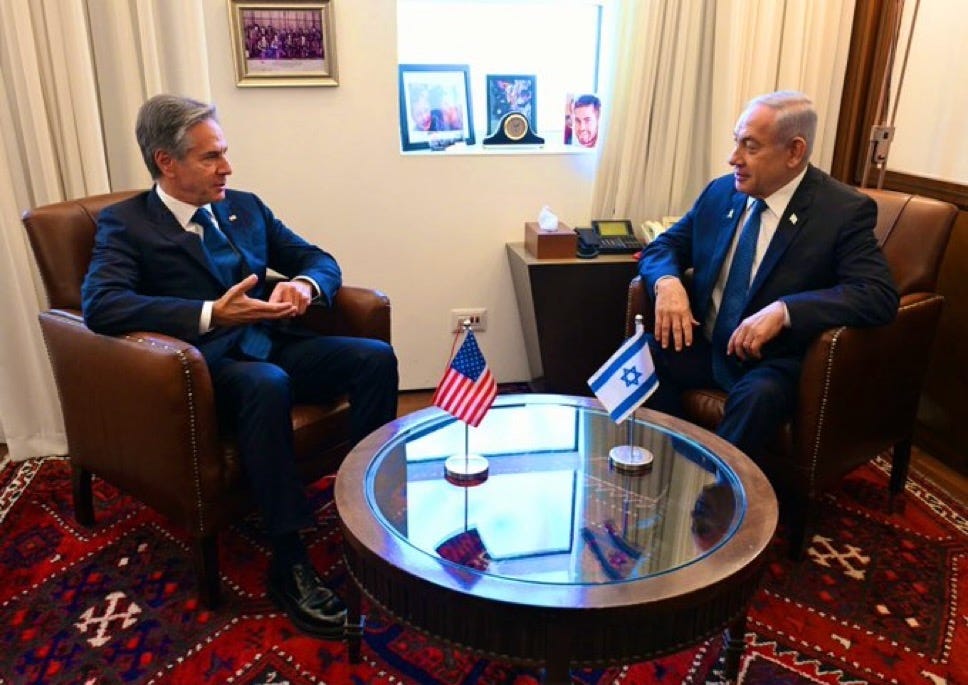
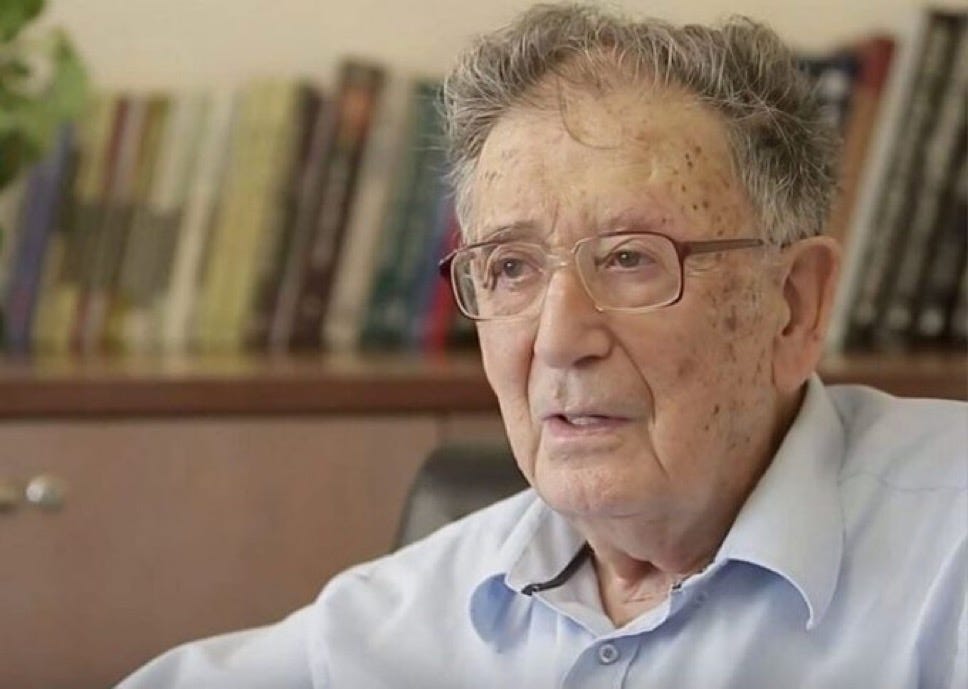
This report suggests the failings to implement 1701 go even deeper:
https://www.israelhayom.com/2024/10/18/how-unifil-became-hezbollahs-human-shield/
Thank you for all the work you do on this newsletter
I had never seen nor read 1701 Seeing how detailed it is and how it was completely ignored by both sides. meaning Israel allowed this disregarding to happen is even more disturbing